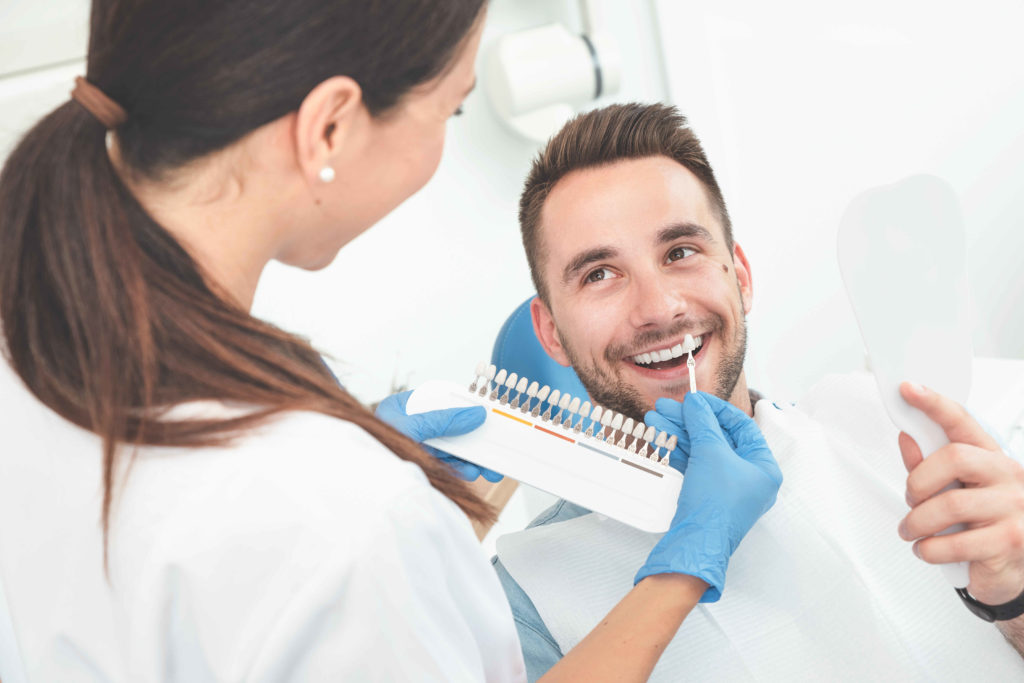When the Swiss are asked what they'd like to improve their smile, they mostly dream of white teeth. In fact, tooth whitening is one of the most popular aesthetic treatments, from dental clinics in Fribourg to dental practices in Lausanne. Why do teeth lose their sparkle? What can I do to keep my teeth white? How does tooth whitening work? Find out all the answers in this article.
Causes of tooth discoloration
Teeth can become dull or yellow over time for a variety of reasons:
Poor dental hygiene
This is obviously the number-one factor in tooth loss. Visit Swiss Society of Dentists recommends brushing at least twice a day for 2 minutes with a fluoride toothpaste. And don't neglect the interdental spaces, which are high-risk areas par excellence. Use dental floss and interdental brushes.
Feeding
Regular, prolonged consumption of certain beverages can impair tooth whiteness. This is particularly true of coffee, tea, red wine and brown soft drinks, which are concentrated in colored pigments that bind to the enamel.
Smoking
It has long been proven that alltobacco products are harmful to oral health. The yellowing of smokers' teeth is due to nicotine. The naturally black tar in tobacco blackens enamel.
Age
While you can limit your consumption of staining foods and tobacco, it's hard to fight the effects of time. With age, the white enamel layer thins out, revealing yellowish dentine.
Trauma
When you experience a violent shock to the oral cavity, your body reacts by producing more dentine. As this layer is darker than enamel, teeth appear dull.
Medication
Some pharmaceutical products have the side effect of darkening teeth. This is the case with certain antihistamines, antipsychotics and blood pressure medications. Chemotherapy, as well as radiation to the neck and head, are also implicated. Taking certain antibiotics, notably tetracycline, at an early age or during pregnancy can cause tooth discoloration in adulthood.
White teeth in the dental office
Tooth whitening is a simple process. The whitening products used by your dentist in Fribourg or Lausanne are gels. They contain a regulated dose of hydrogen peroxide or carbamide peroxide. Depending on the concentration and duration of application, the product offers more or less intense results. It removes stains accumulated on teeth and in enamel imperfections.
Contraindications tooth whitening
Before undergoing tooth whitening in Switzerland, we recommend that you consult your dentist. He or she will check for the presence of cavities or gum disease, as well as wear and tear on the teeth. Tooth whitening is not possible before any oral problems have been treated. In some cases, it is categorically inadvisable. That's why tooth whitening should never be carried out without professional advice. In this regard, please read our article on the dangers of tooth whitening.
Bleaching in the dental office
Here's how laundering works at a HELVIDENT dental center in Lausanne, Fribourg or Aigle :
- Application of a concentrated gel to your teeth and gum protection
- First 8-minute session: the gel is activated by a special high-power lamp
- Change of gel and second 8-minute session
A full teeth whitening session usually involves 3 gel applications under the lamp. If, after several weeks, the result is insufficient, you can have an additional session.
Home tooth whitening
HELVIDENT offers you the option of whitening at home. First, you make an appointment with one of our dentists to take impressions of your teeth. The dental laboratory then makes 2 custom-made trays which you are invited to collect.
When you get home, you apply the gel supplied in the trays before placing them on your teeth. Repeat this operation every day until you achieve the desired whiteness. This may take 5 or 20 days, depending on the situation.
At HELVIDENTOur team of dentists performs all standard dental procedures. Your smile is our priority.

